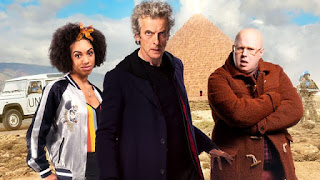 |
| Promo pic for "The Pyramid at the End of the World" (from BBC One - Doctor Who, Series 10, The Pyramid at the End of the World) ©BBC |
Last time around we got a fresh, interesting take on a conspiracy thriller, which got to actually pull the trigger on killing people because it was actually a computer simulation. This time around, we get the people who set up that computer simulation, arriving in a giant pyramid for some reason (effect, I guess) and telling humanity that they're doomed unless they let the Monks rule over them. Their simulations pointed to this moment, and it's up to the Doctor to work out why and then stop it.
This episode is co-written by Peter Harness, who wrote last series' Zygon two-parter, which is probably why this episode has a similar feel. There's a sense of international danger presented that's rather nice, although it does require the Doctor being President of Earth again. I dunno; the first time it was a fun gag, the second time it was like, "Yeah, OK", and this time around it's starting to get tiresome. That might be because now that it keeps showing up we have to actually consider what it means, rather than just letting it be a throwaway joke. Is it really likely that Earth would readily give up sovereignty to an alien? Or even to a single person? This is one of those things that seems less and less likely the more you look at it. (That said, I'm fully in favor of them bringing this back next series, now that we know the thirteenth Doctor will be female.)
 |
| The Monks activate their plane-catching beam. ("The Pyramid at the End of the World") ©BBC |
So that's what doesn't work. What does work are the smaller moments. Watching Bill's date with Penny go awry a second time, this time due to the appearance of the UN Secretary General instead of the Pope, is still fun, and both actresses sell it really well. (Ooh, and a quick dig at the US President's Cheeto-like complexion.) Nardole also gets some fun moments ("Course I can [hack the systems], I'm not just sexy"), and the way he keeps helping the Doctor with his blindness is nicely done as well. But this episode is primarily the Doctor's, and Capaldi does a great job with it, standing up to the Monks, working out what the problem threatening humanity is and how to track it down, and his interactions with lab scientist Erika (played wonderfully by Rachel Denning) are lovely to behold. And the other thing that really does work is the doomsday scenario they've concocted, with a killer bacteria being unwittingly unleashed (almost) upon the world through a series of small accidents that compound into one big one. (This is reminiscent of the genetic alteration of plant bacteria Klebsiella planticola, which was modified to produce alcohol when it broke down crop residue but when introduced into non-sterile soil would have (possibly) killed all plant life due to alcohol poisoning -- and note that the strain used here has a similar name.) This is played as a simple mistake with horrific consequences for the entire world as it aggressively breaks down organic matter (with Capaldi's one-time Thick of It co-star Tony Gardner being the first victim, as Erika's lab partner Douglas), with the possibility of it being vented into the larger world. The way the Doctor finds out which lab is having the problem is also clever. (The geography of the lab and what portions are safe from the bacteria and the Doctor's sterilizing explosion and which are affected is occasionally confusing though. And so if the Monks had never shown up then the world would have definitely been doomed then, yeah? So maybe it's a good thing they showed up when they did...)
So in general this is a pretty average episode, with some logical problems but a number of good moments to counterbalance. But the ending is fantastic, by making it hinge on the Doctor's hubris. He can't quite bring himself to tell Bill (or anyone besides Nardole, in fact) that he's blind, and while the sonic sunglasses help him with larger shapes they can't help him with images or painted details. And so he's defeated the Monks and saved the planet from mass extinction, but because he hasn't told anyone (like, say, Erika) that he's blind, he can't open the combination lock to get out of the affected areas. And so rather than have him die, Bill consents to let the Monks rule Earth, so long as the Doctor gets his sight back and can escape the explosion. It makes the Doctor pay for his pride in a very significant way, refusing to let him off the hook, and it's incredible to watch it happen, to know what Bill is going to do. This is one of those quintessential "defeat snatched from the jaws of victory" moments, and is easily the most memorable part of the episode. That alone helps tip the balance for this episode to the "favorable" side. "You'd better get my planet back!" Bill tells the Doctor, but we'll have to wait until the conclusion to see what happens. The "next time" trailer certainly suggests that that might be a problem, what with the Doctor now working for the Monks and all...
278 Three minutes to midnight is where the real Clock was set until January 2017, when the inauguration of the new US President, Donald Trump, helped nudge the clock thirty seconds closer. But that didn't happen until literally a week after they finished filming this story, which is why there's this slight discrepancy.